七年级上册英语六单元知识点:unit6
人教版英语七年级上册Unit6知识点总结
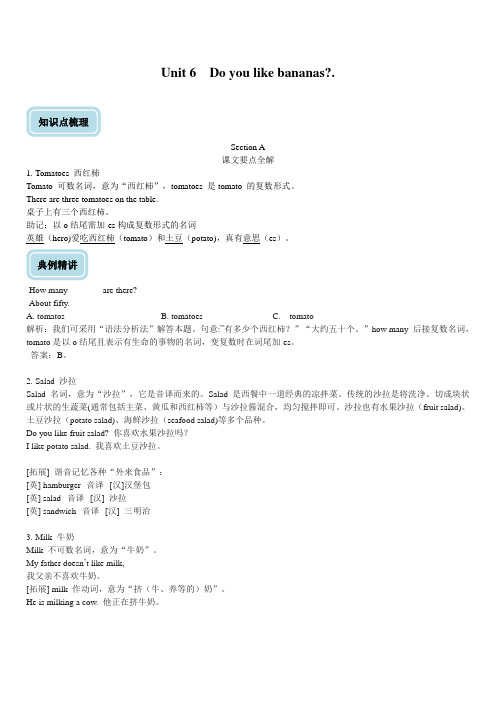
Unit 6 Do you like bananas?.知识点梳理Section A课文要点全解1.Tomatoes 西红柿Tomato 可数名词,意为“西红柿”,tomatoes 是tomato 的复数形式。
There are three tomatoes on the table.桌子上有三个西红柿。
助记:以o结尾需加-es构成复数形式的名词英雄(hero)爱吃西红柿(tomato)和土豆(potato),真有意思(es)。
典例精讲-How many________are there?-About fifty.A.tomatosB. tomatoesC. tomato解析:我们可采用“语法分析法”解答本题。
句意:”有多少个西红柿?”“大约五十个。
”how many 后接复数名词,tomato是以o结尾且表示有生命的事物的名词,变复数时在词尾加-es。
答案:B。
2.Salad 沙拉Salad 名词,意为“沙拉”,它是音译而来的。
Salad 是西餐中一道经典的凉拌菜。
传统的沙拉是将洗净、切成块状或片状的生蔬菜(通常包括主菜、黄瓜和西红柿等)与沙拉酱混合,均匀搅拌即可。
沙拉也有水果沙拉(fruit salad)、土豆沙拉(potato salad)、海鲜沙拉(seafood salad)等多个品种。
Do you like fruit salad? 你喜欢水果沙拉吗?I like potato salad. 我喜欢土豆沙拉。
[拓展] 谐音记忆各种“外来食品”:[英] hamburger--音译--[汉]汉堡包[英] salad--音译--[汉] 沙拉[英] sandwich--音译--[汉] 三明治k 牛奶Milk 不可数名词,意为“牛奶”。
My father doesn’t like milk,我父亲不喜欢牛奶。
[拓展] milk 作动词,意为“挤(牛、养等的)奶”。
He is milking a cow. 他正在挤牛奶。
人教版七年级英语上册 Unit 6 知识归纳(含答案)
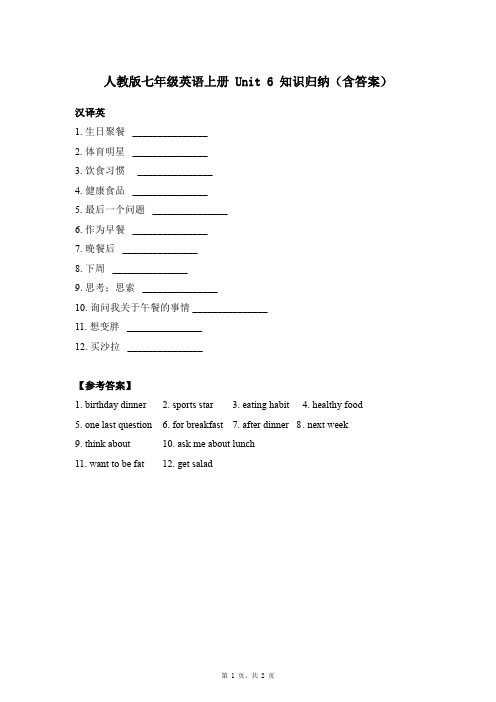
人教版七年级英语上册 Unit 6 知识归纳(含答案)汉译英1.生日聚餐_______________2.体育明星_______________3.饮食习惯_______________4.健康食品_______________5.最后一个问题_______________6.作为早餐_______________7.晚餐后_______________8.下周_______________9.思考;思索_______________10.询问我关于午餐的事情_______________11.想变胖_______________12.买沙拉_______________【参考答案】1. birthday dinner2. sports star3. eating habit4. healthy food5. one last question6. for breakfast7. after dinner8. next week9. think about10. ask me about lunch11. want to be fat12. get salad汉译英1. Cindy认为她妹妹喜欢冰激凌。
____________________________________ 2.那么咱们喝牛奶吧!____________________________________ 3. Jack喜欢什么蔬菜?____________________________________ 4.——咱们早饭吃什么?——水果沙拉怎么样?____________________________________ ____________________________________ 5.——Tom喜欢梨吗?——不,他不喜欢。
____________________________________ ____________________________________ 6.——你们午饭后吃草莓吗?——是的,我们吃。
冀教版英语七年级上册Unit 6 Let's Go!知识点详解 (含答案)

Unit 6 Let’s go!词汇精讲1.ride v.骑;乘坐【用法详解】ride在此处作动词,常见用法如下:ride a/the/one's bike(to...)骑自行车(去……)ride horses/a horse 骑马ride to+地点名词骑车去某地Mary rides her bike to school every day.玛丽每天骑自行车去上学。
My father likes riding horses.我爸爸喜欢骑马。
We can ride to the park.It's near here.我们可以骑车去公园。
它离这儿不远。
【拓展延伸】ride还可作名词,意为”(乘车或骑车的)短途旅程;供乘骑的游乐设施”。
Steve gave me a ride on his motorbike.史蒂夫用摩托车捎了我一程。
The rides are free.免费乘坐。
2.take a/the bus 乘坐公共汽车【用法详解】take a/the bus意为"乘坐公共汽车"。
take作动词,在此处意为"乘坐(某种交通工具)",其后接车、船或飞机等交通工具,即:take a/the bus/train/taxi/plane 等。
You can take a bus to the zoo.你可以坐公共汽车去动物园。
Shall we take a taxi to the hospital? 我们坐出租车去医院,好吗?【拓展延伸】take作动词的其他用法:(1)意为”拿;取”。
Take the books to the classroom,please.请把这些书拿到教室里。
(2)意为"选中;买下”。
I like the T-shirt.I'll take it.我喜欢这件T恤衫。
我要把它买了。
3.get off 下车;从……下来She gets off the bus and turns left. 她下了公共汽车,然后往左拐了。
人教版七年级上册英语知识点全第六单元unit6知识点
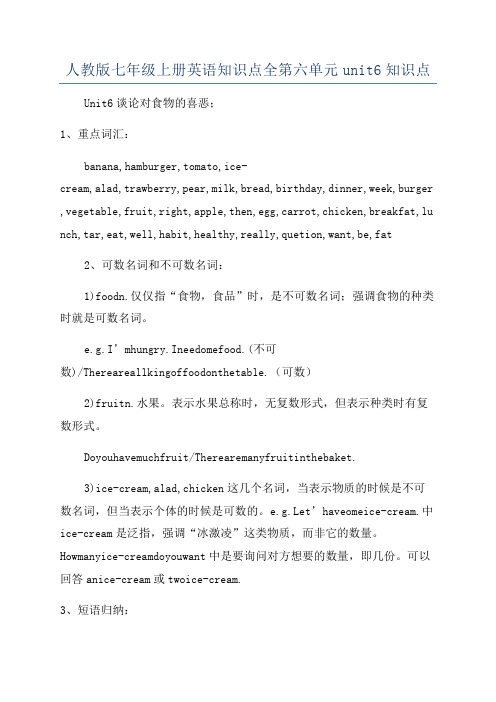
人教版七年级上册英语知识点全第六单元unit6知识点Unit6谈论对食物的喜恶;1、重点词汇:banana,hamburger,tomato,ice-cream,alad,trawberry,pear,milk,bread,birthday,dinner,week,burger ,vegetable,fruit,right,apple,then,egg,carrot,chicken,breakfat,lu nch,tar,eat,well,habit,healthy,really,quetion,want,be,fat2、可数名词和不可数名词:1)foodn.仅仅指“食物,食品”时,是不可数名词;强调食物的种类时就是可数名词。
e.g.I’mhungry.Ineedomefood.(不可数)/Thereareallkingoffoodonthetable.(可数)2)fruitn.水果。
表示水果总称时,无复数形式,但表示种类时有复数形式。
Doyouhavemuchfruit/Therearemanyfruitinthebaket.3)ice-cream,alad,chicken这几个名词,当表示物质的时候是不可数名词,但当表示个体的时候是可数的。
e.g.Let’haveomeice-cream.中ice-cream是泛指,强调“冰激凌”这类物质,而非它的数量。
Howmanyice-creamdoyouwant中是要询问对方想要的数量,即几份。
可以回答anice-cream或twoice-cream.3、短语归纳:John’birthdaydinner约翰的生日晚餐ne某tweek下周thinkabout思考,考虑howabout怎么样omefruit一些水果hibirthday他的生日porttar体育明星eatinghabit饮食习惯forbreakfat作为早餐fordinner作为晚餐onelatquetion最后一个问题healthyfood健康的食品3、tomato可数n.“西红柿”复数形式:tomatoe人教版七上2022知识点总结全类似的以o结尾的名词,需加–e构成复数形式的单词还有potato,hero但photo等词而是以加—构成复数形式的。
外研新版初中英语七年级上册第六单元Unit 6 The power of plants 讲义
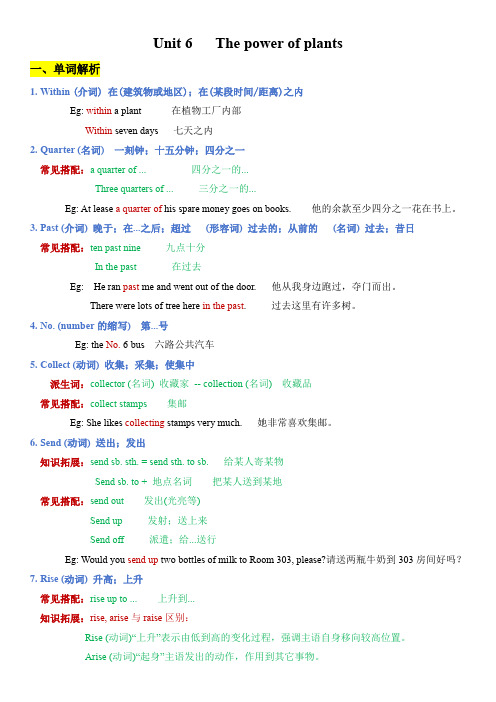
Unit 6 The power of plants一、单词解析1.Within (介词) 在(建筑物或地区);在(某段时间/距离)之内Eg: within a plant 在植物工厂内部Within seven days 七天之内2.Quarter (名词) 一刻钟;十五分钟;四分之一常见搭配:a quarter of ... 四分之一的...Three quarters of ... 三分之一的...Eg: At lease a quarter of his spare money goes on books. 他的余款至少四分之一花在书上。
3.Past (介词) 晚于;在...之后;超过(形容词) 过去的;从前的(名词) 过去;昔日常见搭配:ten past nine 九点十分In the past 在过去Eg: He ran past me and went out of the door. 他从我身边跑过,夺门而出。
There were lots of tree here in the past. 过去这里有许多树。
4.No. (number的缩写) 第...号Eg: the No. 6 bus 六路公共汽车5.Collect (动词) 收集;采集;使集中派生词:collector (名词) 收藏家-- collection (名词) 收藏品常见搭配:collect stamps 集邮Eg: She likes collecting stamps very much. 她非常喜欢集邮。
6.Send (动词) 送出;发出知识拓展:send sb. sth. = send sth. to sb. 给某人寄某物Send sb. to + 地点名词把某人送到某地常见搭配:send out 发出(光亮等)Send up 发射;送上来Send off 派遣;给...送行Eg: Would you send up two bottles of milk to Room 303, please?请送两瓶牛奶到303房间好吗?7.Rise (动词) 升高;上升常见搭配:rise up to ... 上升到...知识拓展:rise, arise与raise区别:Rise (动词)“上升”表示由低到高的变化过程,强调主语自身移向较高位置。
七年级上册义务教育版英语书unit6知识点
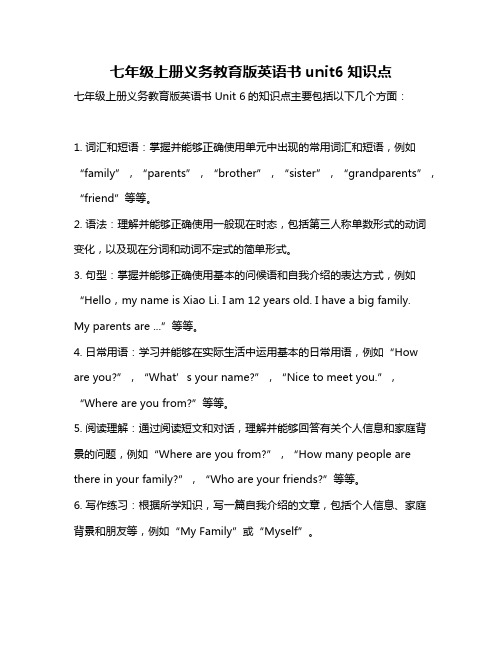
七年级上册义务教育版英语书unit6知识点
七年级上册义务教育版英语书Unit 6的知识点主要包括以下几个方面:
1. 词汇和短语:掌握并能够正确使用单元中出现的常用词汇和短语,例如“family”,“parents”,“brother”,“sister”,“grandparents”,“friend”等等。
2. 语法:理解并能够正确使用一般现在时态,包括第三人称单数形式的动词变化,以及现在分词和动词不定式的简单形式。
3. 句型:掌握并能够正确使用基本的问候语和自我介绍的表达方式,例如“Hello,my name is Xiao Li. I am 12 years old. I have a big family.
My parents are ...”等等。
4. 日常用语:学习并能够在实际生活中运用基本的日常用语,例如“How are you?”,“What’s your name?”,“Nice to meet you.”,“Where are you from?”等等。
5. 阅读理解:通过阅读短文和对话,理解并能够回答有关个人信息和家庭背景的问题,例如“Where are you from?”,“How many people are there in your family?”,“Who are your friends?”等等。
6. 写作练习:根据所学知识,写一篇自我介绍的文章,包括个人信息、家庭背景和朋友等,例如“My Family”或“Myself”。
以上是Unit 6的主要知识点,要掌握这些知识点需要大量的练习和反复的实践。
同时,要注重英语口语和听力的训练,以便在实际生活中更好地运用英语进行交流。
七年级上册英语第六单元总结
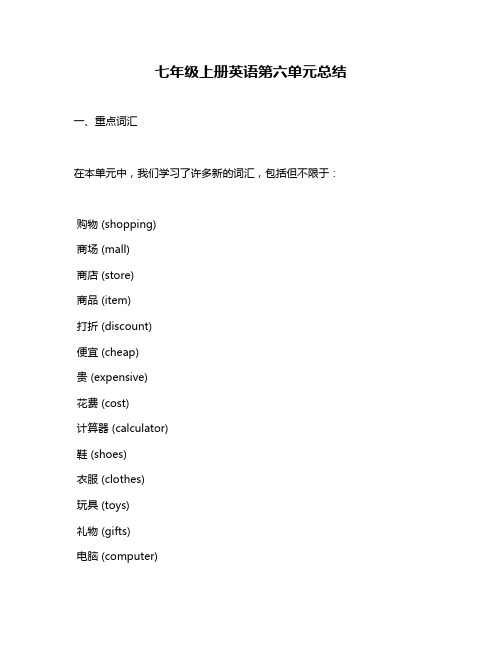
七年级上册英语第六单元总结一、重点词汇在本单元中,我们学习了许多新的词汇,包括但不限于:购物 (shopping)商场 (mall)商店 (store)商品 (item)打折 (discount)便宜 (cheap)贵 (expensive)花费 (cost)计算器 (calculator)鞋 (shoes)衣服 (clothes)玩具 (toys)礼物 (gifts)电脑 (computer)手机 (cellphone)电视 (TV)微波炉 (microwave)电饭煲 (rice cooker)二、主要句型在第六单元中,我们学习了以下主要的句型:1. "How much does it cost?" - "It costs $XX."2. "How much does it cost to buy a TV?" - "It costs $XX."3. "I need to buy a new pair of shoes." - "There are several stores in the mall that sell shoes."4. "This pair of shoes is too expensive." - "You might want to try another store."5. "I can't find the calculator I was looking for." - "You might want to try another store."6. "Do you have any discounts?" - "Yes, we do. XX% off for students."7. "Do you want to buy this pair of shoes?" - "Yes, I do." / "No, Idon't."8. "How much are these clothes?" - "They are $XX each."9. "I want to buy a gift for my friend." - "There are some nice toys in this store."10. "Do you want to come with me to the mall?" - "Yes, I do." / "No, I don't."三、语法重点在本单元中,我们重点学习了询问物品价格和进行购物对话的常用表达方式。
七年级上册英语第六单元总结归纳

七年级上册英语第六单元总结归纳以下是七年级上册英语第六单元的总结归纳:一、词汇1. like: 喜欢2. dislike: 不喜欢3. hamburgers: 汉堡包4. tomatoes: 西红柿5. strawberries: 草莓6. oranges: 橙子7. ice-cream: 冰淇淋8. salad: 沙拉9. French fries: 炸薯条10. bananas: 香蕉11. milk: 牛奶12. bread: 面包二、重点句型1. Do you like hamburgers? 你喜欢汉堡包吗?Yes, I do. / No, I don't. 是的,我喜欢。
/ 不,我不喜欢。
2. Does he/she like tomatoes? 他/她喜欢西红柿吗?Yes, he/she does. / No, he/she doesn't. 是的,他/她喜欢。
/不,他/她不喜欢。
3. What do you like for breakfast/lunch/dinner? 你早餐/午餐/晚餐喜欢吃什么?I like... for breakfast/lunch/dinner. 我早餐/午餐/晚餐喜欢吃……三、语法1. 一般现在时的用法:表示经常或习惯性的动作或状态。
2. 肯定句:主语+动词原形+其他3. 否定句:主语+don't/doesn't+动词原形+其他4. 一般疑问句:Do/Does+主语+动词原形+其他四、写作描述自己或他人的饮食喜好,包括喜欢和不喜欢的食物以及一日三餐的饮食习惯。
- 1、下载文档前请自行甄别文档内容的完整性,平台不提供额外的编辑、内容补充、找答案等附加服务。
- 2、"仅部分预览"的文档,不可在线预览部分如存在完整性等问题,可反馈申请退款(可完整预览的文档不适用该条件!)。
- 3、如文档侵犯您的权益,请联系客服反馈,我们会尽快为您处理(人工客服工作时间:9:00-18:30)。
七年级上册英语六单元知识点:unit6
词汇:
1.水果banana香蕉 orange橙子strawberry草莓pear梨 apple苹果
2.蔬菜 tomato西红柿 carrot胡萝卜broccoli花椰菜
3.食品 hamburger汉堡包 French fries薯条ice cream冰淇淋
salad沙拉chicken鸡肉 egg鸡蛋
4.countable nouns可数名词 uncountable nouns不可数名词
5.running star赛跑明星
6.lots of = a lot of非常多,很多(后面既可跟可数名词复数,也可跟不可数名词)
7.healthy food健康食品
8. have sth. for breakfast/lunch/dinner/dessert 早餐/中餐/晚餐/甜点吃,
句型:Do you like salad? Yes, I do./No, I dont.
Does he like pears? Yes, he does./No, he doesnt.
I like oranges. I dont like oranges.
Running star eats lots of healthy food.
语法:句中谓语动词是实义动词的陈述句,变否定形式在实义动词前加dontdoesnt(主语是第三人称单数时用doesnt).
like doing sth/like to do sth 喜欢做某事
I like swimming. She likes to eat hamburgers.
句式:
1.询问某人是否喜欢某物的句型及答语
-Do/Does sb. like sth.? -Yes,sb. do/does. -No,sb. dont/doesnt.
-Do you like salad?-Yes,I do./ No,I dont.
-Does he like pears?-Yes,he does. / No,he doesnt.
2.祈使句Lets do sth. Lets have ice cream.
3.一般现在时的肯定句及否定句 I like oranges. I dont like bananas.
They like salad. They dont like broccoli.
She likes bananas. She doesnt like ice cream.
这篇七年级上册英语六单元知识点的内容,希望会对各位同学带来很大的帮助。
